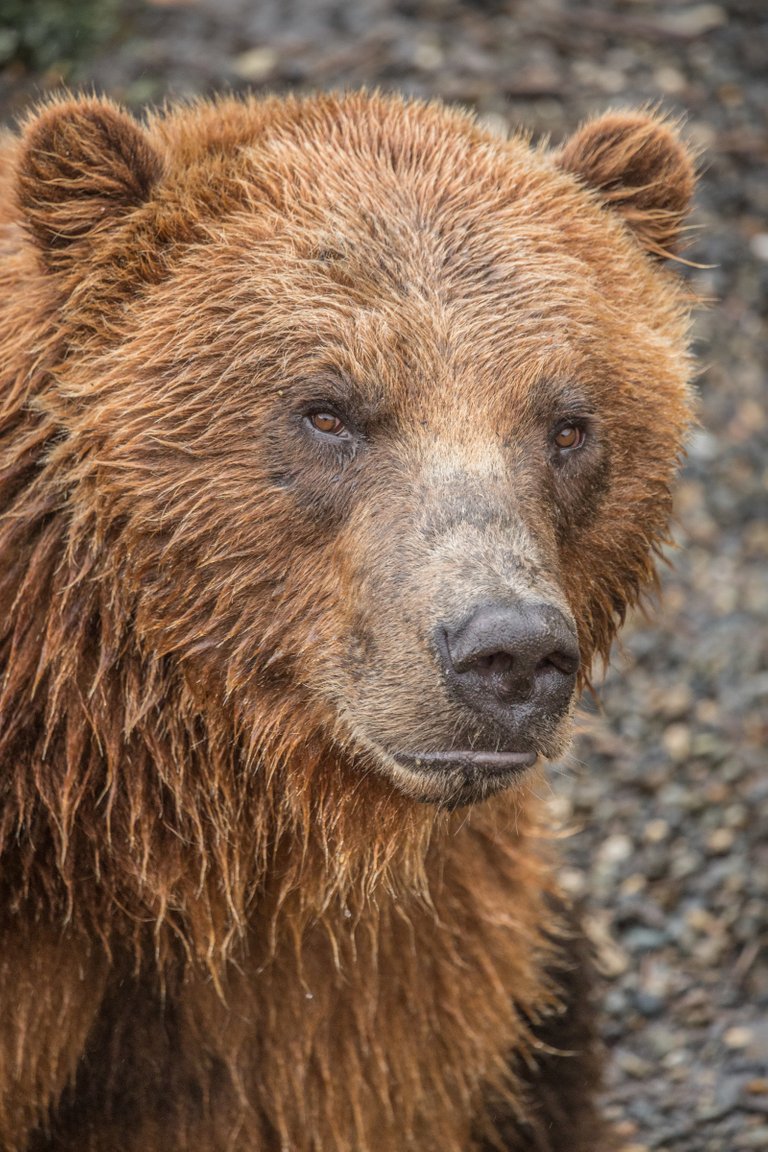A close up of an ABC Islands bear (Ursus arctos sitkensis) or Sitka brown bear taken on Baranof Island. It is a subspecies of brown bear or grizzly bear that resides in Southeast Alaska and is found only on the ABC Islands (Admiralty Island, Baranof Island, and Chichagof Island) . The bear is slightly different to a standard brown bear in that around 6.5% of the X chromosomes from the ABC Islands bears have recently come from polar bears. This is in contrast to 1% of the ABC Islands bears genomes containing polar bear DNA. It is believed that the present polar bear DNA stems from a group of polar bears that were stranded in Southeast Alaska at the end of the last glacial period due to receding ice. Male brown bears migrated to the island and interbred, leaving the phenotype and genotype of these bears to be primarily brown bear.
The story of the ABC islands bear is warning as to the future of all polar bears as the arctic continues to warm at twice the rate of the rest of the world and the fastest rate in measurable history. The media often focuses on the record low summer sea ice coverage which according to NASA is declining at a rate of 13.2% per decade and accelerating. However perhaps more startling is the US National Snow and Ice Data Center (NSIDC) report released in April on the age of arctic sea ice which provides a better indicator of the decreasing thickness of the ice and total ice volume. Ice older than one year covered 61% of the region in 1984, compared to just 34% in 2018. Only 2% of the Arctic’s sea ice is now five years old or older, compared to 30% in 1984. With several consecutive years of winter heatwaves in the arctic, the total surface area of the ice is now shrinking in across all seasons, not just in summer. Seems we are heading for an ice free summer arctic within 10 and 30 years from now.
Robert Downie
Love Life, Love Photography
All images in this post were taken by and remain the Copyright of Robert Downie - http://www.robertdowniephotography.com

Good pic, by the hair and facial expression, this bear is relaxed! Quite often, they don't like having pictures taken! This is an interesting topic indeed and intriguing about the genes. You may also find it interesting to read some data from that of the scientists that have been studying the bears around places like the Hudson Bay of Canada for several decades. For example, from such places, it has been observed that bears are very adaptive in thought of swapping genes and adapting to food both on land and in bay areas. The American Museum of Natural History has several reads on the subject as well. Bears are quite incredible animals.
Thanks for the support and detailed comments. Would love to get to Hudson Bay
The bear is looking so old and weak.I think he also know that his habitat is going to destroy in future becuase of activities of best class of species known as human,who were gifted by the god with so many talents so that he can help another breeds of earth and we are so selfish that for money and hapiness we can do anything
Good publication, maybe these post will help us to love more the art of photography and animals, thanks for your publications
Cheers.
I always ask myself what is it that I can do. Sad.
Education is the key.
Yesss.
Hi
Bear is oldy
Great photo and nice writeup. Thanks for posting under the #photomag tag.
Thanks. Appreciate the support and upvotes and love the idea of photomag.